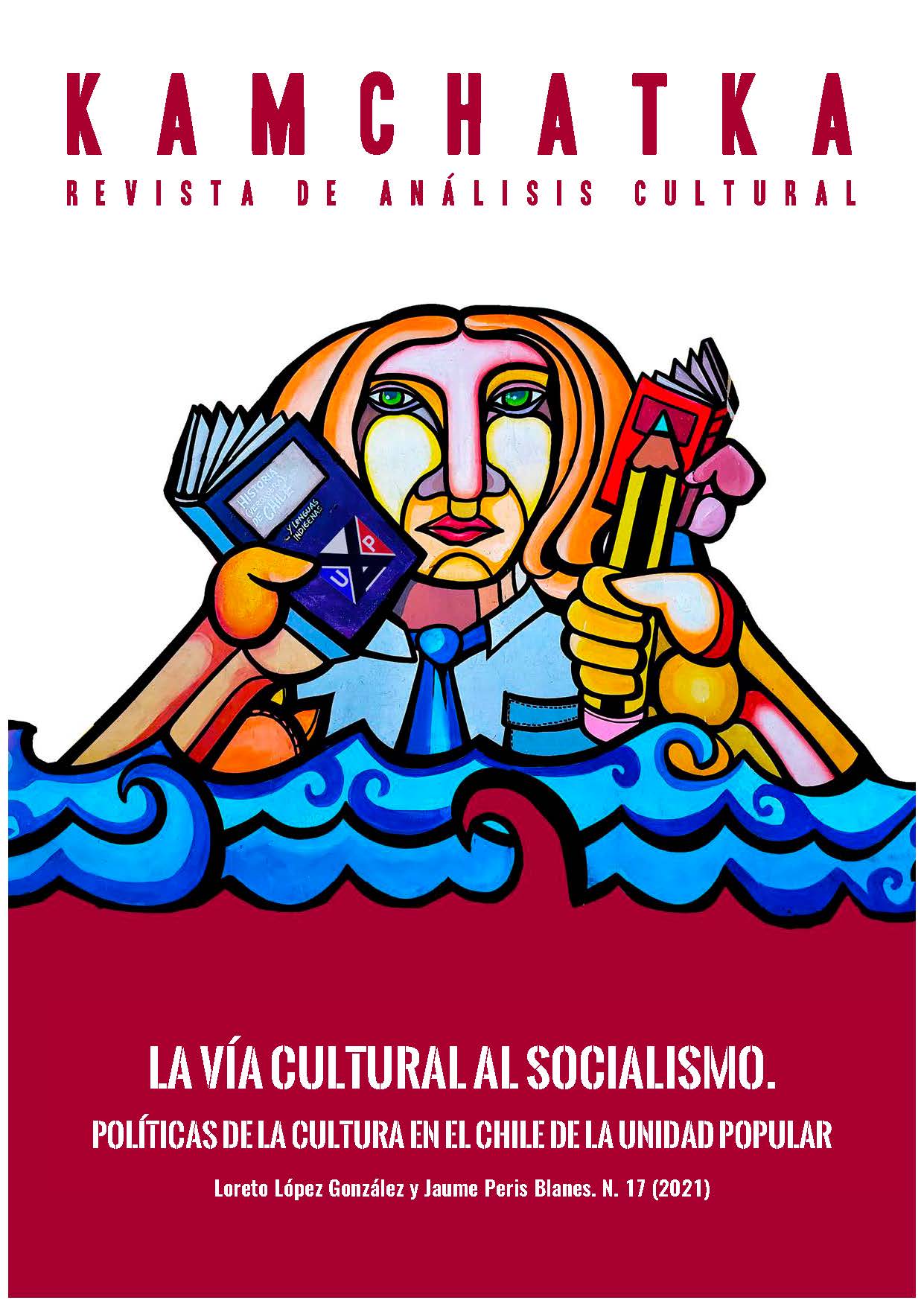Four thesis on literature during Chilean Popular Unity
DOI:
https://doi.org/10.7203/KAM.17.18083Keywords:
Chile, Popular Unity, Literature Abstract
Abstract
In this essay, four theses are developed to explain the invisibility of literature during the Chilean Popular Unity. These four theses approach literary production from different perspectives that form a critical constellation that weaves together works and readings from both historical and contemporary points of view. The first thesis proposes the invisibility of literary history during the Chilean UP. The second speculates that literary works may have failed to articulate the rapidly changing collective event of the Unidad Popular into a memorable work. The third argues that literature during the UP found itself cornered between the mass media and the emergence of the popular. The fourth thesis, on the other hand, points to the contemporary reading of these works: from the post-dictatorship - as a paradigm of political, social and cultural interpretation - which conceives of the UP project on the basis of the failure of the left and the mourning of dictatorial violence, it is incapable of reading literature during the UP as a valuable, interesting and complex object.
 Downloads
Downloads
 References
References
Álvarez, Ignacio (2009). Novela y nación en el siglo XX chileno. Santiago: Ediciones UAH.
Austin, Robert. (1994). Literacy programs in Chile, 1964-1993. Anales, 3(1), 107-120.
Avelar, Idelber (2000). Alegorías de la derrota. Santiago: Cuarto Propio.
Ayala, Matías (2010). Lugar incómodo. Santiago: Ediciones UAH.
Bowen, Martín. "El proyecto sociocultural de la izquierda chilena durante la Unidad Popular. Crítica, verdad e inmunología política". Nuevo Mundo Mundos Nuevos, 2008. [En línea] Consultado 18/08/2016 http://nuevomundo.revues.org/13732.
Cánovas, Rodrigo (1997). Novela chilena, nuevas generaciones. El abordaje de los huérfanos. Santiago: Ediciones Universidad Católica de Chile.
Campos, Javier (1988). "La poesía chilena joven en el período 1961-1973" en Ricardo Yamal ed. La poesía chilena actual (1960-1984) y la crítica. Concepción: Ediciones Lar, 19-49.
Cárcamo-Huechante, Luis (2007) Tramas del mercado. Santiago: Editorial Cuarto Propio.
Culler, Jonathan (1997). Literary theory: a very short introduction. Oxford: Oxford University Press.
Deisler, Guillermo. Poemas visivos y proposiciones a realizar. Antofagasta: Ediciones Mimbre, 1972
Del Valle Dávila, Ignacio (2014). Cámaras en trance. El nuevo cine latinoamericano, un proyecto cinematográfico continental. Santiago: Cuarto Propio.
Dorfman, Ariel (1973). Moros en la costa. Buenos Aires: Sudamericana.
Dorfman, Ariel y Armand Mattelart (1971). Para leer al Pato Donald, Valparaíso: Ediciones Universitarias de Valparaíso
Dorfman, Ariel (1974). Ensayos quemados en Chile (Inocencia y neocolonialismo). Buenos Aires: Ediciones de la Flor.
Dubar, Claude (2011). "Temps de crises et crise des temps", Temporalités [En ligne], 13 | 2011, mis en ligne le 22 juin 2011, consulté le 12 juin 2020. URL : http://journals.openedition.org/temporalites/1563
Eagleton, Terry (1983). Literary Theory. An Introduction. Minneapolis: University of Minnesota Press.
Epple, Juan Armando (1988). "Nuevos territorios de la poesía chilena" en Ricardo Yamal ed. La poesía chilena actual (1960-1984) y la crítica. Concepción: Ediciones Lar, 51-71.
Gilman, Claudia (2003). Entre la pluma y el fusil. Debates y dilemas del escritor revolucionario en América Latina. Buenos Aires: Siglo XXI.
Goic, Cedomil (1968). La novela chilena: los mitos degradados. Santiago de Chile: Editorial Universitaria.
Jameson, Fredric (1991). Postmodernism, or, The Cultural Logic of Late Capitalism. Durham: Duke University Press.
Lihn, Enrique (1973). Batman en Chile. Buenos Aires: Ediciones de La Flor.
Lihn, Enrique et. al. (1971) La cultura en la vía chilena al socialismo. Santiago: Editorial Universitaria.
Mouesca, Jacqueline (1988). Plano secuencia de la memoria de Chile: veinticinco años de cine chileno (1960 – 1985). Madrid: Ediciones del Litoral.
Moulian, Tomás (1998). Conversación ininterrumpida con Allende. Santiago: Lom.
Oelker, Dieter (1995). “La novela chilena del último siglo by José Promis”-Notas: Reseñas iberoamericanas. Literatura, sociedad, historia, Vol. 2, n. 2, 106-109.
Parra, Nicanor (1972). Artefactos. Santiago: Ediciones Nueva Universidad.
Promis, José (1993). La novela chilena del último siglo. Santiago: La Noria.
Quezada, Jaime ed. (1973). Poesía Joven de Chile. México: Siglo XXI.
Quiñones, Guillermo ed. (1973). Poesía Combatiente. Grandes poetas del siglo XX Santiago: Quimantú.
Skármeta, Antonio (1975). Soñé que la nieve ardía. Barcelona: Plaza Janés.
Subercaseaux, Bernardo (1984). Historia del libro en Chile. Santiago: Céneca.
Richard, Nelly (2001). Residuos y metáforas. Santiago: Cuarto propio.
Rivera Aravena, Carla. (2015). Diálogos y reflexiones sobre las comunicaciones en la Unidad Popular. Chile, 1970-1973. Historia y Comunicación Social. 20(2), 345-367.
Rojas, Waldo (2001). Poesía y cultura poética en Chile. Santiago: Usach.
Rosa, Hartmut (2013). Social Acceleration: a New Theory of Modernity. New York: Columbia University Press.
Thayer, Willy (2006). El fragmento repetido. Santiago de Chile, Ediciones Metales Pesados.
Zarowsky, Mariano (2013). Del laboratorio chileno a la comunicación-mundo: un itinerario intelectual de Armand Mattelart. Buenos Aires: Editorial Biblos.
Downloads
Published
How to Cite
-
Abstract1011
-
Artículo PDF (Español)572
Issue
Section
License
This journal provides an immediate free access to the content on the principle that freely make investigation available to the public, which promotes an increased global knowledge exchange.
Unless otherwise indicated, texts published in this journal are under the license Attribution-NonComercial 4.0 by Creative Commons. These texts may be copied, distributed and publicly communicated whenever the publication’s author and title are quoted and whenever they are not used for commercial purposes. In any case, intellectual property of the articles and its potential economic rights entirely belong to its authors.
The full license can be consulted on https://creativecommons.org/licenses/by-nc/4.0/. We encourage authors to disseminate papers published in Kamchatka. Journal of cultural analysis electronically, in institutional digital repository or in their websites.





